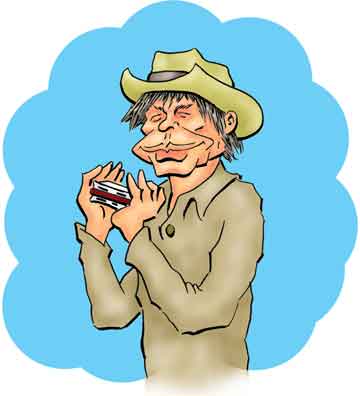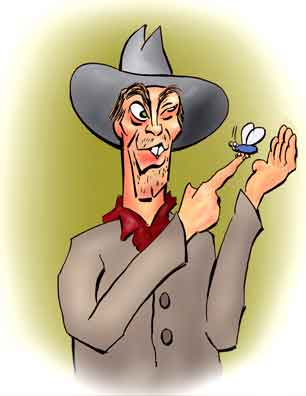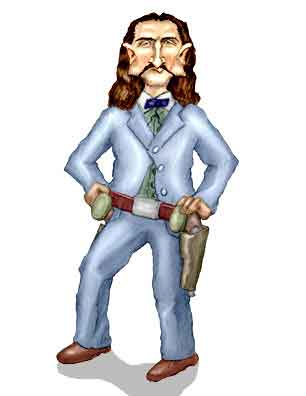Charles Bronson
Not Such a Bad Guy

Charles Bronson
"Harmonica"
Born as Charles Dennis Buchinsky, Charles Bronson was one of the most popular actors from the 1960's through the 90's with his peak popularity in the 70's and 80's. Among the movies he appeared in were The Great Escape, The Dirty Dozen (he was one of the three characters to actually survive the commando raid), and The Valachi Papers.
With all due respect to modern tastes, Charles's role as the revenge bent vigilante in Death Wish was far inferior to his role presented here. We mean, of course, the role of Harmonica in Once Upon a Time in the West.
Harmonica shows up in the first scene - now one of the most iconic openings of a western (or any movie for that matter). Three gunfighters - played by Jack Elam, Woody Strobe, and Al Mulock - arrive at a railroad station to meet Harmonica. They were sent by a merciless killer named Frank (played by Henry Fonda). Although the scene is without dialogue until the end, nevertheless the three men's comically strange behavior makes it clear that they are true psychopaths.

Jack Elam
The Bad Guy
The three gunmen wait as the train unloads some freight. But no one gets off. So they turn to leave only to hear the erie musical wailing. The train pulls out showing Harmonica playing his namesake instrument on the other side of the track.
We don't know how Harmonica set up the meeting. But clearly he was expecting to meet Frank himself. As the gunmen stare at him, he looks at Jack.
Charles: And Frank?
Jack replies.
Frank sent us.
Charles sees there's only three horses tethered in the background.
You bring a horse for me?
Jack looks back at the horses and laughs.
Looks like we're - [chuckles] - looks like we're one horse shy.
The other gunmen join in the laughter.
Charles shakes his head and answers.
You brought two too many.
Once Upon a Time in the West was one of the "Spaghetti Westerns" directed by Sergio Leone. Today Baby Boomers remember Sergio for these films that broke the mold of the western but few realize that he also directed the cheesy swords-and-sandals movie The Colossus of Rhodes starring beefcake strongman Steve Reeves.
The public who saw Once Upon a Time in the West recognized it as an exceptional film and so were all the more surprised at the lukewarm or even negative reception by the American critics. One problem with the film - at least from an aesthetically and critical standpoint - was this wasn't the typical western with good guys and bad guys. There were just varying degrees of badness.
Of course, Harmonica was a "good bad guy" as was Cheyenne (Jason Robards) and the [girl] with the heart of gold, Jill, (played by Claudia Cardinale). Henry's character was a major departure for the actor who was best known for playing strong minded and honorable good men of unimpeachable character. Frank, though, was a merciless killer who would gun down a six year old boy to keep his identity secret.
Gunman: What are we going to do with this one, Frank?
Frank: Now that you called me by name.
There is, we admit, a glaring hole in the plot. We conclude that Harmonica had arranged the meeting with Frank. But Frank didn't know what it was about. And he didn't care. So rather than take any chances, he sent Jack, Woody, and Al to take care of the stranger right then and there, no questions asked.
Soon Frank takes Harmonica captive. He roughs Harmonica up and asks who he is. Harmonic replies with the names of men Frank has killed. And yet Frank lets him walk away. Finally Frank agrees to meet Harmonica in a fast draw duel, which, of course, Frank loses.
But why would a cold-blooded murderer arrange to kill a victim and then when he meets him face-to-face lets him go free? Few people - including the critics - seemed to recognize the illogic of such a plot. Lack of logic, though, never spoils a good movie.
Instead what caused most real problems was the editing. The final film runs for nearly three hours. For the time this was a long movie. So in some releases, particularly in the United States, a number of scenes were cut. Yes, this shortened the movie, but it also left glaring gaps in the story.
For instance, American audiences saw that after Charles shoots Jack, Woody, and Al at the station, Woody gets off a final shot that brings Charles down. But then Charles soon shows up in another scene apparently unhurt. What the hey?
What was cut was a scene where Charles painfully recovers consciousness (he was shot in the arm) and manages to leave the station (despite what some critics said, this scene was omitted in the American theatrical release). Other cuttings also left out parts of the story that would have helped keep the action flowing smoothly.
But most critics simply objected to the story as it was written. One scholar found particular fault with the minimalist dialogue which he said was to stare, deliver a line, and then stare again. But in the end, the public won out and even the critics became convinced that Once Upon a Time in the West was a landmark in cinema. Eventually the film was selected by the Library of Congress as being of particular cultural and historical importance.

Wild Bill Hickok
Not Charles's Best
We can't say the same for Charles's later movie The White Buffalo. Here Charles plays Wild Bill Hickok who keeps having dreams about being attacked by a white buffalo. To exorcise the vision, he goes out hunting the beast.
Complicating the matter is that Crazy Horse, played by Native American actor Will Sampson, is hunting the same buffalo. It turns out that earlier the animal went on a rampage through his village and killed his daughter. So Crazy Horse has to get the skin as a burial shroud so his daughter's spirit can rest in peace.
The movie has almost been universally panned. Part of the problem was that the special effects then relied on a mechanical contraption that instead of looking like a rampaging white buffalo looked like a mechanical contraption that was created to look like a rampaging white buffalo.
Some reviews of the movie point out that Wild Bill (Charles) wears dark glasses. Some have suggested that Wild Bill wore his shades - particularly blue tinted glasses - due to light sensitivity caused by what the English called the French Disease, the French called the Neapolitan Disease, and the Turks called the Christian Disease. Of course, this is simply one possibility out of many. For all we know Wild Bill wore dark glasses to keep the sun out of his eyes.
One scene is based on another bit of Wild Bill's legend. That was when he was ambushed by a gang of cavalry soldiers in a bar in Hays City, Kansas. Naturally Wild Bill bests the all.
Amazingly, this scene is based on a true event. While taking his ease in a bar in Hays City, Kansas, Wild Bill was indeed accosted by two soldiers (some accounts say three). Despite what you read, Tom Custer, the brother of George was not involved in this altercation.
Wild Bill was standing at the bar when one of the soldiers walked up behind and pinioned his arms. Wild Bill got his own gun free and ended up shooting the soldiers, one of which later died. Wild Bill jumped out of a window to make his escape.
There are contemporary references to the fight both in newspapers and in a diary by Annie Gibson Roberts whose soon-to-be husband, Lieutenant George Yates, would eventually fall with Custer at the Little Bighorn. Annie mentioned that Wild Bill had also been hit. However, if so the wound must have been slight. Wild Bill at the time was a Deputy Federal Marshal and was back at his job within a week.
References
"Once Upon a Time in the West", Colin Covert, Film Society, Minneapolis-St. Paul.
"Once Upon a Time in the West", Internet Movie Data Base.
"On TV Westerns of the 1950s and '60s," Stephen Kiss, New York Public Library, December 1, 2012.
"Was 'Wild Bill' Hickok's Failing Eyesight the Result of a Venereal Disease?", Marshall Trimble, Ask the Marshall, True West, June 11, 2017.
"Wild Bill's Brawl with Two of Custer's Troopers", Jeff Broome, Wild West, July 26, 2013.